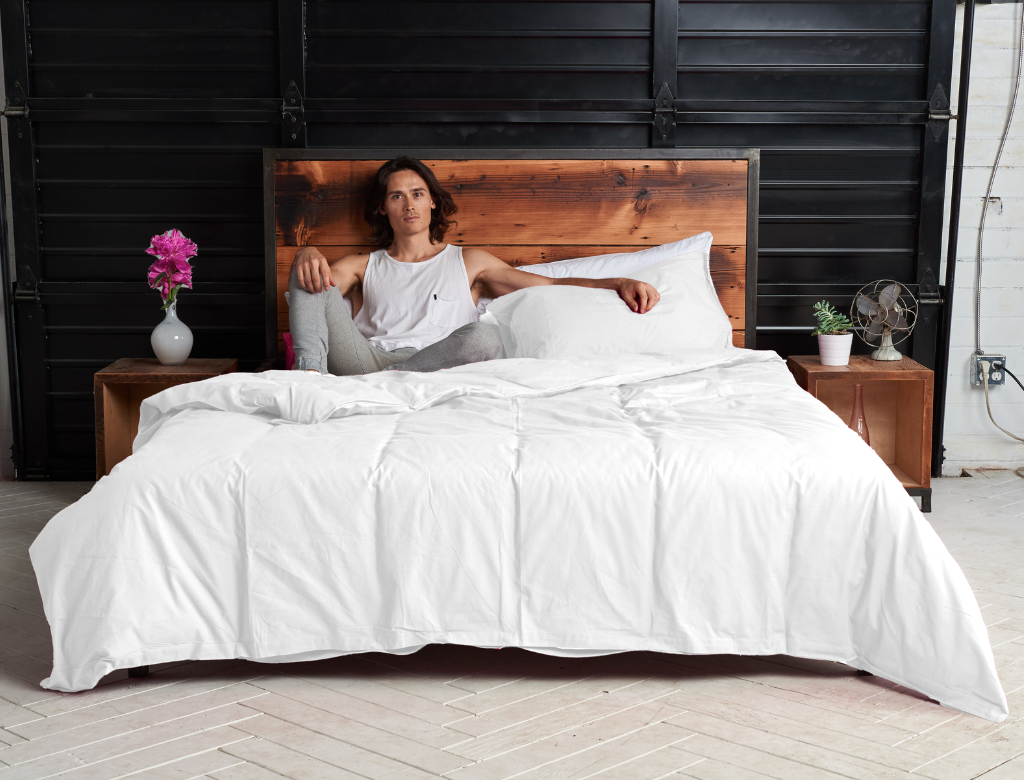When it comes to picking out bedding, there are a lot of choices to make. But one of the first decisions you'll need to make is deciding between a duvet and a comforter. Both duvets and comforters can keep you warm and cozy, but there are key differences between them.
Your bed has the potential to be your haven and happy place after a long day of activity. So getting into it where you get those last-day moments of relaxation, slow down your body and head, and get comfy for a good slumber.
There are some important elements you need on your night sanctuary, no matter if you sleep side-sitting or on your back. One of the most crucial parts is temperature control is what you put on top of your mattress; this will be influenced by where you live to decide how much cover ourselves with blankets and pillows so that our bodies feel cozy while trying hard not to wake up anyone else around us during nights in bed.
So, you're thinking about getting a new comforter or duvet to spice up your bedroom? You might be surprised by what kind of difference it makes.

What are the differences between Duvet and Comforter?
If you feel confused on what are the differences between a Duvet and a Comforter, you are not alone! Indeed, they have a lot in common, both duvets and comforters are Fluffy and cozy, are typically filled with down, feathers or synthetic fibres, and can be enjoyed all year round.
There are, at the same time, some noticeable differences between a Duvet and a Comforter. First of all, Comforter is an All-In-one quilted blanket to use as it is, it acts as both a comfy top layer for sleeping or lounging around the house. A Duvet is a bed cover with 2 parts, the duvet itself, which is put into the cover to protect the duvet. This makes it easier to use and clean, there is no bulky comforter to know your washer off balance.
On the other hand, a duvet can keep you warmer. It was originally designed to use without a top sheet or extra blankets, but you can do so. Both are fluffy to keep you warm. You can find them on different materials and thicknesses for better temperature control. But one thing is true, both add a lot of aesthetics to your bed and room.
In addition to these commonalities, there are some less noticeable differences that can vary from product to product:
Fill Power — Typically, duvets feature a higher fill power, which means they’re often fluffier than comforters.
Sewn-through Pattern — Comforters always feature a sewn-through quilted pattern to ensure an even distribution of internal fill. Duvets usually do too, but sometimes they look more like a loose, fluffy bag.
Size — Though comforters are usually less fluffy than duvets, they are often larger in size, offering more hangover on the mattress.
More About Duvets?
Duvets are usually made from natural materials like cotton or linen. The duvet itself is filled with down feathers, wool, or synthetic fibre batting. And it's covered with a removable cover that can be washed separately from the duvet itself. Duvets are typically heavys, making them ideal for colder climates or winter months. They're also usually more expensive than comforters. One downside of duvets is that they're not as easy to clean as comforters. Duvets should be dry cleaned or sent out to a professional laundry service to prevent the filling from bunching up.
More About Comforters?
Comforters are typically filled with synthetic materials like polyester or cotton blends. Why is it quilted? It is usually quilted or stitched in a pattern to keep the filling in place and evenly distributed. Comforters are typically lighter weight, making them ideal for warmer climates or summer months.
Sleeping with a Comforter also means no more struggle to put a cover back on it after washing it. It can be machine washed on a gentle cycle, but it should be hung to dry to prevent the filling from bunching up.

Duvet vs Comforter: Pros and Cons
Summarizing what are the pros and cons of both Duvet and Comforters are:
Duvet Pros and Cons
Pros:
- Lightweight fabrics make them fluffier in texture
- Easy to clean
- Freshen up the look of your bed with ease
- Easy to switch out or replace one element at a time
- Can swap out duvet insert for a heavier or less heavy option based on the season
- Can have multiple duvet covers for rotation giving a different look each time
Cons
- Does not provide as much coverage (overhang)
- Can prone to bunching inside the cover
- Sometimes awkward assemble
- Duvet inset can be difficult to wash and takes a long time to dry
Comforter Pros and Cons
Pros:
- No assembly required
- Maintains its shape and its filling is evenly distributed
- Great for decoration as they hang over the bed more than duvets
- Ready to use
Cons:
- Harder to clean. Dry-clean only
- They have a tendency to flatten over time
- They might not be warm enough during winter months
- Ove set weight and density for all year round
So, which one should you choose? If you're looking for something light and airy for warmer months, go with a comforter. If you're looking for something warm and cozy for colder months, go with a duvet. And if you're looking for something that's easy to clean, go with a comforter (just be sure to hang it up to dry!). Whatever you choose, you'll be sure to stay cozy all night long.
Have you met our Duvet Covers? Click Here



0 comments